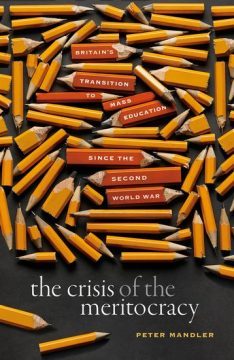 Timothy Larsen over at the LARB:
Timothy Larsen over at the LARB:
Peter Mandler’s truly impressive study, The Crisis of the Meritocracy: Britain’s Transition to Mass Education since the Second World War, is a deeply researched account of secondary and higher education in Britain during the last seventy-five years. Along the way, it raises and explores some of the largest questions that one can ask about the provision of education: what is it for?; who is it for?; and what subjects should students be studying? As a People’s History, The Crisis of Meritocracy is a tour de force of revisionist insight – slaying assumptions and myths of both the political left and right by keeping its focus fixed on the wishes and actions of young people and their parents. Every claim is advanced with painstaking precision regarding the particular place, time period, percentages, exceptions, and so on. Indeed, the last 134 pages are all scholarly apparatus, beginning with seventeen tables and charts. All this meticulousness has the effect of making a reviewer feel guilty about mining this volume for big-picture discussion points applicable to other nations. It feels a bit like being a tabloid journalist distilling a technical study for crass coverage: “Mandler Manhandles Meritocratic Muddle.” Nevertheless, it is worth the risk, as Mandler’s significant, original, and thought-provoking findings will help us think more clearly about education today, not only in Britain, but also in the United States and elsewhere.
More here.
